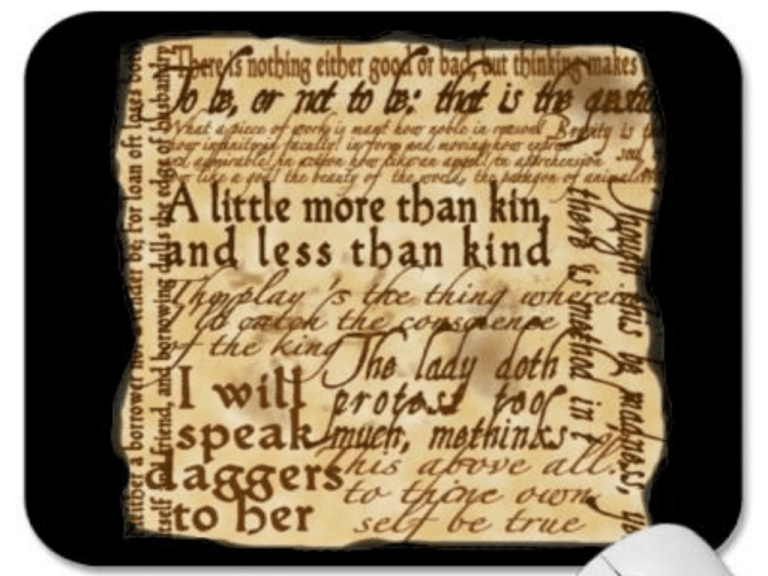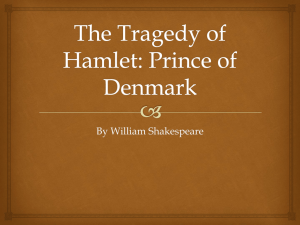power point
advertisement

Hamlet By William Shakespeare Tragic hero • A tragic hero has the potential for greatness but is doomed to fail. • He makes some sort of tragic flaw, and this causes his fall from greatness. • Realizes he has made an irreversible mistake • Faces and accepts death with honor • Meets a tragic death Tragic heroes are: • • • • Born into nobility Responsible for their own fate Endowed with a tragic flaw Doomed to make a serious error in judgment Hamlet Prince of Denmark • Shakespeare's Hamlet is one of his most popular tragedies. • Death, suicide, murder, graves • Ghost—question afterlife • No traditional Christian comfort or justice. • But the message is ultimately one of hope. Idea for theme • Watch how Hamlet -- who starts by wishing he were dead -- comes to terms with life, keeps his integrity, and strikes back successfully at what's wrong around him. Relevant for Today • Hamlet leaves us with the message that life is indeed worth living, even by imperfect people in an imperfect world. On a sheet of paper … • • • • Write down your name Write down your mother's name Write down your father's name Write down your paternal uncle's name • To connect to the play, cross out your father's name. He just died. • Draw a line connecting your mother's name to your uncle's. A month has passed. Your mother has just married your uncle. • The issue of Gertrude's marriage to Hamlet's uncle surfaces immediately in the first words Hamlet speaks in the play: “A little more than kin and less than kind” (1.2.67). • Notice whether Claudius and Gertrude's marriage was politically or romantically motivated and whether Gertrude took played a part in the death of King Hamlet. Written around 1601 Published in 1603 Setting: Denmark • A remake of an already popular play—Ur-Hamlet • Based in turn on historical fiction Amleth, Prince of Denmark 1185 • Based in turn on an episode from the Dark Ages: the lawless, mightmakes-right 7th century era. Motifs and Important Topics • Pay attention to how the play begins: with a question • The blurring of appearance and reality is a motif in this play • Important Topics: fate, supernatural, family, tragic hero, justice. Character List • Hamlet: The Prince of Denmark. About 30 years old at the start of the play, Hamlet is the son of Queen Gertrude and the late King Hamlet, and the nephew of the present king, Cladius. •Claudius: The King of Denmark, Hamlet’s uncle, and the play’s antagonist • Gertrude: The Queen of Denmark, Hamlet’s mother, recently married to Claudius • Polonius: The Lord Chamberlain of Claudius’ court; father of Laertes and Ophelia • Horatio: Hamlet’s close friend, who studied with him at the university in Wittenberg • Ophelia: Polonius’s daughter, who obeys her father and her brother, Laertes. Hamlet has been in love with her. • Laertes: Polonius’s son and Ophelia’s brother • Fortinbras: The young Prince of Norway, whose father the king (also named Fortinbras) was killed by Hamlet’s father (also named Hamlet). • The Ghost: The specter of Hamlet’s recently deceased father • Marcellus and Bernardo: Officers who first see the ghost and who call Horatio to witness it. Marcellus is present when Hamlet first encounters the ghost. • Francisco: A soldier and guardsman at Elsinore (the castle) • Reynaldo: Polonius’s servant, who is sent to France by Polonius to check up on and spy on Laertes






